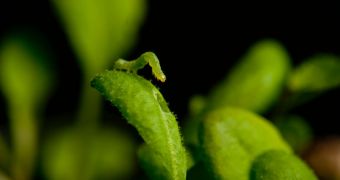Rice University scientists discovered in a new study that plants begin their preparations for the day's battle with hungry insects even before the Sun comes up. They studied a case where the plants were getting ready to fend off hungry caterpillars.
Researches such as this are conducted in order to gain a better understanding of how various plant species develop resistance to pests. One of the most intriguing findings was that plants have their battle plans against insects coded in their circadian clock.
This is a mechanism that controls the processes any organism undergoes during days and nights. Humans have it too, and use it to regulate states such as sleepiness and alertness, in addition to controlling bodily metabolism, enzyme expression patterns and a myriad of other functions.
The Rice team focused its research on detecting the molecular foundation of plants' resilience to pests. Experts determined that daytime insect raids were anticipated by the plants, which started improving their defenses before sunrise.
“When you walk past plants, they don't look like they're doing anything. It's intriguing to see all of this activity down at the genetic level. It's like watching a besieged fortress go on full alert,” study investigator Janet Braam explains.
Details of the investigation were published in this week's issue of the esteemed journal Proceedings of the National Academy of Sciences (PNAS). Braam holds an appointment as a professor and chair of the Department of Biochemistry and Cell Biology at Rice.
In studies of a plant species called Arabidopsis thaliana, researchers found that as many as one third of its genes – including those responsible for responding after the organism is wounded – were activated by the circadian rhythm, regardless of whether the Sun was up or not.
“We wondered whether some of these circadian-regulated genes might allow plants to anticipate attacks from insects, in much the same way that they anticipate the sunrise,” explains Rice biochemist Michael Covington, who is now based at the University of California in Davis (UCD)
“We found that the plants whose clocks were in phase with the insects were relatively resistant, whereas the plants whose clocks were out of phase were decimated by the insects feeding on them,” adds Rice biochemistry and cell biology graduate student Danielle Goodspeed.
The new investigation was made possible by support from the US National Science Foundation (NSF) and the Rice University.

 14 DAY TRIAL //
14 DAY TRIAL // 